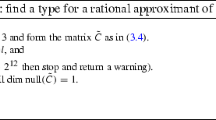Abstract
The exponential analysis of 2n uniformly collected samples from an n-term exponential sum is equivalent to the reconstruction of a rational function of degree n −1 over n. The latter is by computing the Padé approximant of the z-transform of the sequence of samples. In practice, the samples are often noisy and 2n is replaced by N > 2ν with ν > n, leading to a least squares computation of the Padé approximant of degree ν −1 over ν. We show that the latter is a perturbed version of the one of degree n −1 over n and that the n exponential base terms can still be retrieved reliably. This has remained an open problem for many years, despite the fact that the least squares computation was used in most applications.






Similar content being viewed by others
References
Gilewicz, J., Pindor, M.: Padé approximants and noise: a case of geometric series. J. Comput. Appl. Math. 87, 199–214 (1997). https://doi.org/10.1016/S0377-0427(97)00185-4
Gilewicz, J., Pindor, M.: Padé approximants and noise: rational functions. J. Comput. Appl. Math. 105, 285–297 (1999). https://doi.org/10.1016/S0377-0427(99)00041-2
Gonnet, P., Güttel, S., Trefethen, L.N.: Robust Padé approximation via SVD. SIAM Rev. 55, 101–117 (2013). https://doi.org/10.1137/110853236
Householder, A.S.: On Prony’s method of fitting exponential decay curves and multiple-hit survival curves. Report ORNL-455, Oak Ridge National Laboratory (1950)
Guillaume, P., Huard, A.: Multivariate Padé approximation. J. Comput. Appl. Math. 121, 197–219 (2000). https://doi.org/10.1016/S0377-0427(00)00337-X
Ben-Or, M., Tiwari, P.: A deterministic algorithm for sparse multivariate polynomial interpolation. In: STOC ’88: Proceedings of the Twentieth Annual ACM Symposium on Theory of Computing, pp 301–309. ACM (1988), https://doi.org/10.1145/62212.62241
Weiss, L., McDonough, R.N.: Prony’s method, Z-transforms, and Padé approximation. SIAM Rev. 5, 145–149 (1963)
Cuyt, A., Lee, W.-S.: Sparse interpolation and rational approximation. In: Hardin, D., Lubinsky, D., Simanek, B. (eds.) Contemporary Mathematics, vol. 661, pp 229–242. American Mathematical Society (2016), https://doi.org/10.1090/conm/661/13284
Cuyt, A., Knaepkens, F., Lee, W.: From exponential analysis to Padé approximation and Tensor decomposition, in one and more dimensions. In: Gerdt, V.P. (ed.) LNCS11077. https://doi.org/10.1007/978-3-319-99639-4. Proceedings CASC 2018, Lille (France), pp 116–130. Springer, Switzerland (2018)
Hildebrand, F.B.: Introduction to Numerical Analysis, 2nd edn. Dover Publications, Inc. (1987)
Cuyt, A., Tsai, M., Verhoye, M., Lee, W.-s.: Faint and clustered components in exponential analysis. Appl. Math. Comput. 327, 93–103 (2018)
Hua, Y., Sarkar, T.K.: Matrix pencil method for estimating parameters of exponentially damped/undamped sinusoids in noise. IEEE Trans. Acoust. Speech Signal Process. 38, 814–824 (1990). https://doi.org/10.1109/29.56027
Funding
This research has received funding from the European Union’s Horizon 2020 research and innovation programme under the Marie Skłodowska-Curie grant agreement No. 101008231 (EXPOWER).
Author information
Authors and Affiliations
Corresponding author
Ethics declarations
Conflict of interest
The authors declare no competing interests.
Additional information
Data availability
The datasets generated during this study are available on the CEMath webpage at https://cemath.org/publications/papers/.
Publisher’s note
Springer Nature remains neutral with regard to jurisdictional claims in published maps and institutional affiliations.
To the 80th birthday of Claude Brezinski, our very respected colleague in Padé approximation research.
Rights and permissions
Springer Nature or its licensor (e.g. a society or other partner) holds exclusive rights to this article under a publishing agreement with the author(s) or other rightsholder(s); author self-archiving of the accepted manuscript version of this article is solely governed by the terms of such publishing agreement and applicable law.
About this article
Cite this article
Knaepkens, F., Cuyt, A. On the robustness of exponential base terms and the Padé denominator in some least squares sense. Numer Algor 92, 747–766 (2023). https://doi.org/10.1007/s11075-022-01455-z
Received:
Accepted:
Published:
Issue Date:
DOI: https://doi.org/10.1007/s11075-022-01455-z




